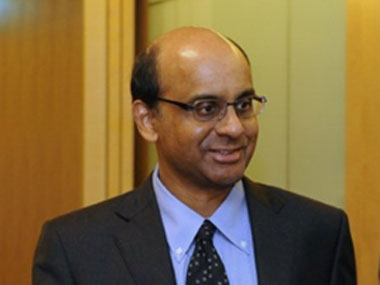By William Overholt
It is doubtful that Washington politicians understand just how important the IMF leadership decision is. This decision is crucial because of a history that Americans have largely forgotten.
During the Asian Crisis of 1997-8, the IMF made two decisions that continue to threaten the world’s ability to have a coherent financial crisis management policy based on a single institution.
First, with the strong support of the US Treasury, it imposed an austerity programme on Thailand that was intended to produce GDP growth of zero percent but instead caused an economic collapse worse than the worst years of the Great Depression.
[caption id=“attachment_15773” align=“alignleft” width=“380” caption=“Singapore’s Finance Minister Tharman Shanmugaratnam can restore the IMF’s global authority. AFP”]  [/caption]
Second, it imposed the closure of a group of Indonesian banks connected to President Suharto without taking any measures to support the rest of the banking system, thereby causing the collapse of the entire banking system. This contrasts sharply with the measures the IMF and the US Treasury have supported in developed countries, namely generous fiscal and monetary support and extreme care to avoid a systemic banking collapse.
Since then, Asians as a group have distrusted the IMF and engaged in a series of efforts to create Asian institutions to counterbalance it in the future. It is only a slight exaggeration to characterise the views of ASEAN countries as parallel to the Israeli oath: Never again.
When Dominique Strauss-Kahn was selected to lead the IMF, Asians were focussed on institution-building: the Chiang Mai Initiative, ASEAN + 3, ASEAN + 6, the East Asian Summit, revival of the idea of an Asian Monetary Fund, even a common Asian currency.
But now attention is heavily concentrated on the choice of a new IMF leader .This choice offers the opportunity to heal a very deep and consequential rift between the IMF and the largest populations and fastest growing economies on the planet.
Conversely, if their voices are ignored, the disillusionment will widen and deepen the rift. Much of the effort to create a global governance system will be lost. Much of the effort that has gone into creation of the G-20 will be wasted; already it is clear that real decisions, like the recent intervention in the Japanese currency, are taken by the G-7 without even notifying countries like China, and in addition it will be clear that governance of the world’s most important economic institutions is still a European-American monopoly.
If we really care about the future of global governance, we’ll look for the most qualified candidate - not the most politically influential, preferably French, European candidate.
Christine Lagarde is an impressive, talented financial leader. But, to take just one example, she does not have the crisis management experience of Singaporean Finance Minister and Monetary Authority head Tharman Shanmugaratnam. She does not have the healing power wielded by an ethnic Indian managing the finances of a predominantly ethnic Chinese city-state, a leader who bridges the West, China, Southeast Asia and India so smoothly that he makes it look easy. Above all, someone like him would restore the global authority of an institution that will eventually prove ineffectual if it is not demonstrably inclusive.
Nobody in Washington wants to irritate the Europeans. But if we choose traditional politics over global unity, everyone in Washington will one day rue the loss of an opportunity to restore the global stature of the IMF.
_William Overholt is senior Research Fellow at Harvard University’s Kennedy School and author most recently of Asia, America and the Transformation of Geopoolitic_s (Cambridge University Press, 2008). Republished with permission from East Asia Forum.


)
)
)
)
)
)
)
)
)



